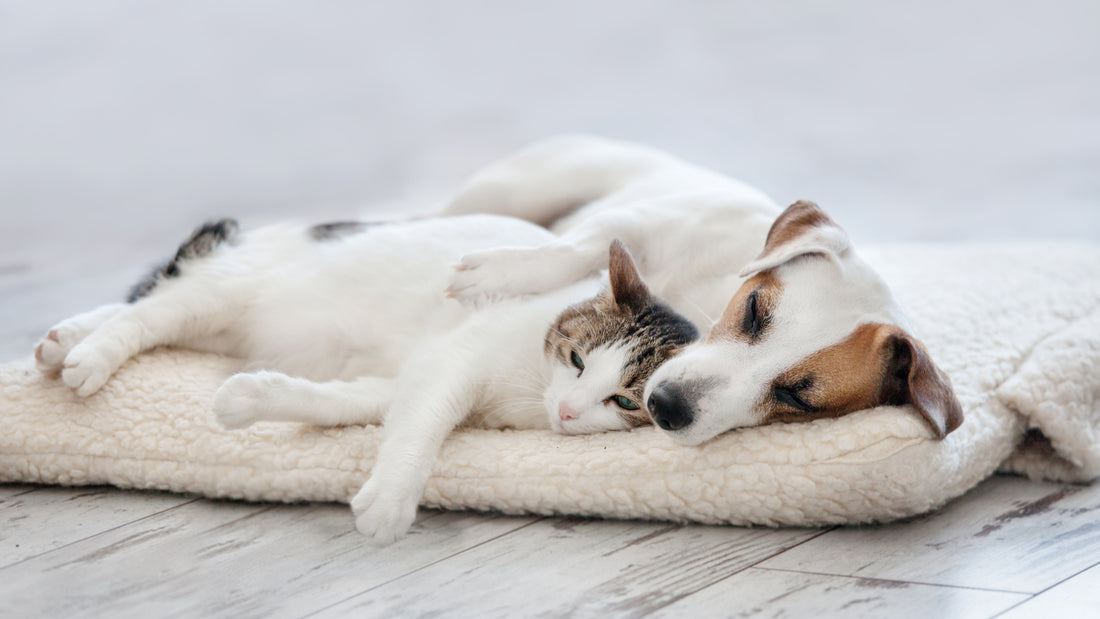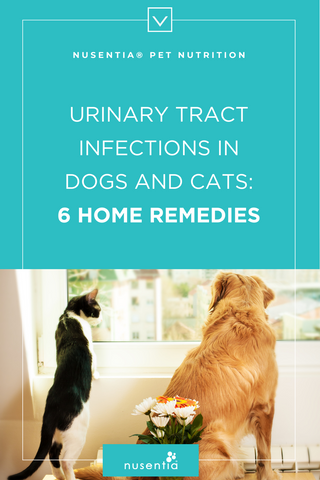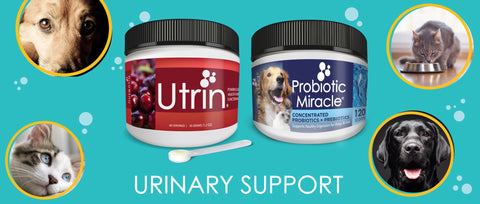Home remedies are often overlooked when our pet's have recurring urinary tract infections. Urinary tract infections are frequent clinical bacterial infections in dogs and cats, especially in older dogs and cats. As your pet ages, the likelihood that they will suffer from these issues, such as incontinence or bladder inflammation increases by about 75%. Because antibiotics are the most common veterinary treatment for urinary tract infections in pets, the bacteria causing UTI have become increasingly more resistant to antibiotic therapies leading us to look for home remedies for cat and dog UTI.
Approximately 14% of dogs overall will encounter a UTI during their lifetime, with an increased occurrence in spayed female dogs and cats.
The more frequent a dog or cat is exposed to antibiotics, the more likely they are to experience other negative side effects from the related therapy. For this reason, we believe it is vital to make use of natural home remedies for UTI that eliminate urinary bacteria and strengthen the bladder system, reducing their occurrence altogether.
In summary, the best home remedies for cat UTI, as well as dogs, include drinking plenty of water and staying clean and dry. Natural supplements like cranberry, D-mannose, and probiotics are also helpful for prevention.
Read on for all 6 of our best home remedies urinary tract infections in dogs and cats.
6 Home Remedies for Dog or Cat UTI
1. Keep plenty of clean water available
It it may seem obvious, water will help flush bacteria from your pet's system, but it's a common oversight. Dogs and cats have a high requirement for water, and If you're feeding a processed or cooked diet, that requirement is even higher. Dogs and cats are at risk of chronic low water intake which can be a factor in the pathogenesis of urinary tract infections.
In addition, make sure their water dish is clean, since standing water can also be a breeding ground for pathogenic bacteria, such as, E. coli. You'll have a better chance of treating your pet's UTI at home by taking this first step.
2. Allow for frequent urination
Not as much of a problem for cats that can easily access the litter box as their need arises, dogs who are unable to urinate for many hours are at risk for bacteria to multiply in the urinary tract.
3. Keep your pet clean and dry
Especially if you have an old dog or if you kennel your dog, make sure your pet is clean after they urinate or defecate, and, check that their sleeping area is also clean and dry. Neglecting these areas can lead to bacteria or fungus growth. Avoid washing with perfumed soaps or shampoos which can irritate the skin's pH and cause your pet to scratch.
4. Supply probiotics daily
For dogs and cats, one of the most promising home remedies is a regular daily dose of probiotics. Bacterial flora is vital for preventing the growth of pathogens that lead to infection in the body, making treating UTI at home more reliable. Galvanize the gut with a probiotic supplement (not yogurt) as the first line of defense against overgrowth of yeast and harmful bacteria that leads to infections. This will also help to colonize the gut with enough good flora, keeping the immune system in tip-top shape.
Read: Probiotics, Top 5 Myths
5. Use cranberry and D-mannose supplements
Getting your dog or cat to eat cranberries is not likely to happen. What we're talking about is a supplement containing the active components of cranberry that helps to inhibit the growth and colonization of bad bacteria in the bladder and urinary tract. (Colombino, 2022)
Also, D-mannose is one of the most exciting substances for UTI because it has been shown to actually prevent certain bad bacteria from attaching to the walls of the urinary tract and significantly reduces the risk of recurrent UTI. D-mannose, at a dose of one quarter teaspoon per 20 pounds of your pet's body weight, 3 times per day has shown to inhibit adhesion of pathogens in the urinary tract. If your dog or cat has been having recurring UTI, D-mannose is going to be your greatest discovery for your pet's future urinary health. (Olin, 2015)
Utrin® is a natural UTI supplement that contains concentrated doses of both cranberry and D-mannose. It has been profoundly helpful for dogs and cats in avoiding UTI.
Utrin and Probiotic Miracle® supplements come together in this discounted urinary health support pack.
6. Remove grains from the diet and feed raw if possible
Feeding grain-free and raw diets to dogs and cats can be beneficial in preventing urinary tract infections (UTIs) due to their high moisture content and lower carbohydrate levels. These diets more closely mimic the natural eating habits of dogs and cats, emphasizing proteins and eliminating grains, which can lead to higher sugar levels in the urine and potentially increase the risk of infection. The increased moisture content in raw diets helps ensure proper hydration, promoting more frequent urination and flushing of the urinary tract, which can help prevent the buildup of bacteria that causes infections. Additionally, the natural enzymes and healthier balance of bacteria in raw food can support a stronger immune system, further aiding in the prevention of UTIs and maintaining overall urinary health.
Conclusion
In conclusion, urinary tract infections present a significant health concern for dogs and cats, particularly as they age. With antibiotic resistance on the rise, turning to natural home remedies offers a viable and effective alternative for preventing and managing UTIs in pets. Ensuring access to clean water, promoting regular urination, maintaining cleanliness, and incorporating natural supplements such as cranberry, D-mannose, and probiotics into their diet can significantly reduce the risk of UTIs. Additionally, adopting grain-free and raw diets can further support urinary health by promoting hydration and reducing the likelihood of bacterial growth. By embracing these strategies, pet owners can help safeguard their furry companions against urinary tract infections, enhancing their overall well-being and quality of life.
References
Colombino, Elena et al. “A new diet supplement formulation containing cranberry extract for the treatment of feline idiopathic cystitis.” Natural product research vol. 36,11 (2022): 2884-2887. doi:10.1080/14786419.2021.1925273
Carvajal-Campos, Amaranta et al. “Adherence of Uropathogenic Escherichia Coli in Dog Urine After Consumption of Food Supplemented with Cranberry (Vaccinium Macrocarpon).” Journal of veterinary research vol. 67,1 49-54. 9 Mar. 2023, doi:10.2478/jvetres-2023-0004
Hutchins, R G et al. “The effect of an oral probiotic containing lactobacillus, bifidobacterium, and bacillus species on the vaginal microbiota of spayed female dogs.” Journal of veterinary internal medicine vol. 27,6 (2013): 1368-71. doi:10.1111/jvim.12174
Olin, S. J., & Bartges, J. W. (2015). Urinary tract infections: treatment/comparative therapeutics. The Veterinary clinics of North America. Small animal practice, 45(4), 721–746. https://doi.org/10.1016/j.cvsm.2015.02.005





2 comments
My cat has uti and he eats only dry catfood what do u recommend
My car is currently taking Hills dry food for Urinary/Stress.
What are some raw food suggestions for her instead of this?